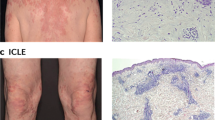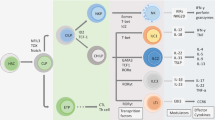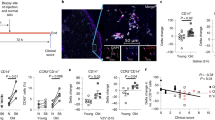Abstract
THE local humoral and cellular events which occur in the skin following cell injury are very similar to those which follow the intradermal injection of soluble antigen in an immunized animal which has antibodies in its circulation. In both cases there is an immediate increase in the permeability of the small blood vessels, adherence of leucocytes to the vessel walls and migration of leucocytes into the surrounding tissue1–3. The usual explanation of this similarity is that the antibody–antigen reaction causes a certain degree of cell damage, with consequent release of the pharmacologically active substances which are also liberated following injury to cells from other causes. In this communication an alternative, and in fact opposite, view is put forward. It is suggested that the reaction due to cell injury is similar to that due to antibody–antigen interaction because damage to cells causes the local formation of antibody–antigen complexes.
This is a preview of subscription content, access via your institution
Access options
Subscribe to this journal
Receive 51 print issues and online access
$199.00 per year
only $3.90 per issue
Buy this article
- Purchase on Springer Link
- Instant access to full article PDF
Prices may be subject to local taxes which are calculated during checkout
Similar content being viewed by others
References
Florey, H., in General Pathology, third ed. (Lloyd Luke, London).
Gell, P. G. H., in Cellular and Humoral Aspects of the Hypersensitive States, edit. by Lawrence, H. S., 43 (Hoeber-Harper, New York, 1959).
Ovary, Z., Intern. Arch. Allergy, 3, 293 (1952).
Waksman, B., Medicine, 41, 93 (1962).
Schmidt, H. (personal communication).
Weil, E., and Braun, H., Berl. Klin. Wchschr., 44, 1570 (1907).
Mayer, M. M., and Heidelberger, M., J. Immunol., 54, 89 (1946).
Eaton, M. D., Murphy, W. D., and Hanford, V. L., J. Exp. Med., 79, 359 (1944).
Roitt, I. M., and Doniach, D., Brit. Med. Bull., 16, 152 (1960).
Grabar, P., Proc. Sixth Intern. Cong. Hæmatol., 833 (Grune and Stratton, New York, 1958).
Jenkin, C. R., and Karthigasu, K., C.R. Soc. Biol. Paris, 156, 1006 (1962).
Boyden, S. V., in Intern. Rev. Exp. Pathol., edit. by Richter (Academic Press, New York) (in the press).
Mackay, I. R., and Burnet, F. M., Autoimmune Diseases (Charles C. Thomas, Springfield, Illinois, 1962).
Friedemann, U., Z. Immunitätsforsch., 2, 591 (1909).
Friedberger, E., Z. Immunitätsforsch., 4, 636 (1909).
Ungar, G., and Mist, S. H., J. Exp. Med., 90, 39 (1949).
Humphrey, J., in Cellular and Humoral Aspects of the Hypersensitive, edit. by Lawrence, H. S., 1 (Hoeber-Harper, New York, 1959).
Rocha e Silva, in The Mechanisms of Inflammation, edit. by Jasmin, G., and Robert, A., 237 (Acta Inc., Montreal, Canada, 1953).
Boyden, S. V., J. Exp. Med., 115, 453 (1962).
Hurley, J. V., Nature, 198, 1212 (1963).
Author information
Authors and Affiliations
Rights and permissions
About this article
Cite this article
BOYDEN, S. Autoimmunity and Inflammation. Nature 201, 200–201 (1964). https://doi.org/10.1038/201200a0
Issue Date:
DOI: https://doi.org/10.1038/201200a0
This article is cited by
-
Autoantibody Production in Obesity: Is There Evidence for a Link Between Obesity and Autoimmunity?
Current Obesity Reports (2020)
-
Autoimmunity in psoriasis
Archives of Dermatological Research (1978)
-
Spontaneous Occurrence of Autoantibodies Cytotoxic to Thymus Cells in the Sera of Mice of the 129 Strain
Nature (1965)
-
Antibody Formation and the Coding Problem
Nature (1965)
Comments
By submitting a comment you agree to abide by our Terms and Community Guidelines. If you find something abusive or that does not comply with our terms or guidelines please flag it as inappropriate.



